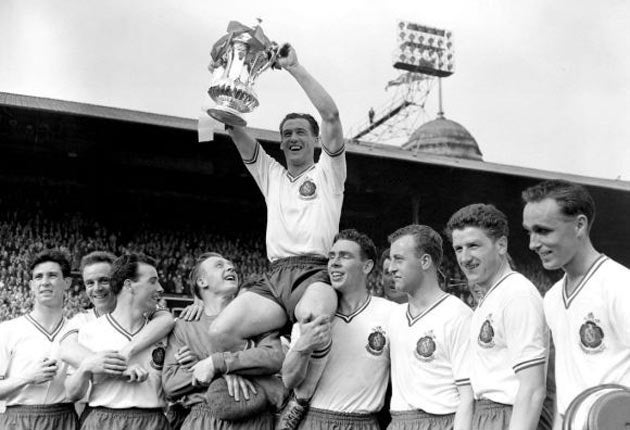Farewell, Nat: Bolton mourns one of its greats

It was billed as the unofficial championship of Europe – Austria v England in 1952 – and the score was 2-2 with seven minutes left when the away team's centre-forward, Nat Lofthouse, picked up the ball on the halfway line. As he dribbled goalwards he was tackled from behind, elbowed in the face and brought down by the goalkeeper, but nothing stopped him slamming the ball into the net to seal a memorable triumph.
The next day the press christened him the Lion of Vienna, and Lofthouse, who died at the weekend aged 85, would have the sobriquet attached to him for the rest of his life.
Lofthouse might perhaps have been even better described as the Lion of Bolton. He was born in the Lancashire town in 1925 and lived there throughout his life, playing more than 500 matches and scoring 255 goals for Bolton Wanderers. It was in a Bolton nursing home that he died, peacefully in his sleep, on Saturday evening.
Lofthouse signed forms with the only club he ever played for as a 14-year-old schoolboy on 4 September 1939, in time to watch the entire first team board military transport to join the war, which had been declared the previous day. His own contribution to the war effort was as a "Bevin Boy" – conscripted at the age of 18 to work in the coal mines. Often he would complete a shift down the pit on a Saturday morning and then play for Bolton in the afternoon. He would not make his league debut until 1946, scoring twice in a 4-3 defeat at Chelsea.
His England call-up came four years later at the age of 25 – too late, in the view of many. At a time when England were perhaps the best side in the world, it was often the leaping forehead of Lofthouse that the two great stars of the day, wingers Tom Finney and Stanley Matthews, would be aiming for when they crossed the ball back from the byline, the old-fashioned English way to play the game that, back then, terrified defences the world over. He would score 30 goals for England in 33 games.
Lofthouse retired in 1960 after a serious knee injury, but his association with Bolton Wanderers continued for more than half a century as a player, trainer, coach, manager, chief scout, and president. He received an OBE in 1994.
Bolton chairman Phil Gartside said: "Nat undoubtedly is a Bolton Wanderers legend. He was a one-club man and our football club meant as much to him as he did to us. We will miss him but we will celebrate his life, his legacy and great times that he brought to Bolton Wanderers."
Commenting on the wealth of the professional era, the man himself said: "The game's changed out of all recognition to my day. The strip's changed, the ball's changed and the money has changed. But I still believe footballers take great pride in the game."
Lofthouse was given £10 as his signing-on fee. He said: "I know £10 doesn't seem much these days but it was four times more than my Dad was getting per week as a coal bagger for the Co-Op."
Join our commenting forum
Join thought-provoking conversations, follow other Independent readers and see their replies
Comments
Bookmark popover
Removed from bookmarks